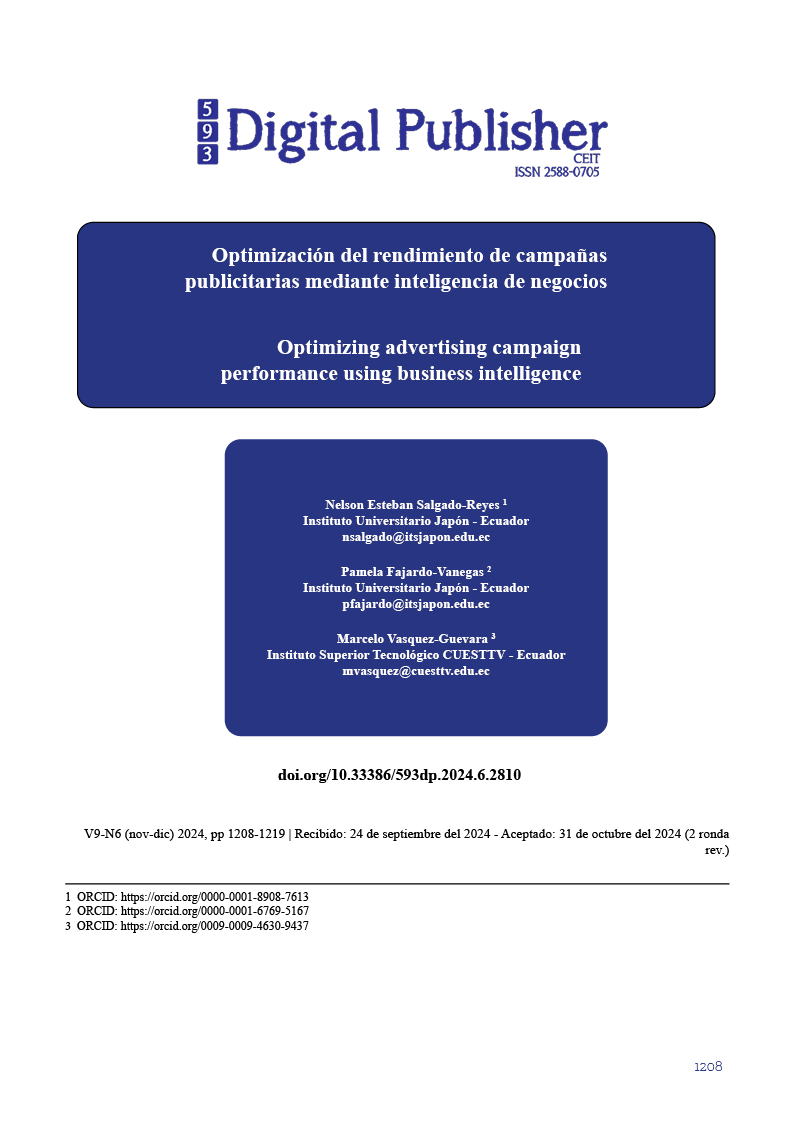Optimizing advertising campaign performance using business intelligence
Main Article Content
Abstract
This study analyses how business intelligence (BI) can optimise digital advertising campaigns through real-time data analysis, advanced audience segmentation and ad personalisation. Data was collected from 200 active campaigns across different sectors and company sizes. Multivariate analysis techniques were used to assess the impact of BI strategies on return on investment (ROI), conversion rate and customer loyalty.
The results indicate that real-time data analysis significantly improves ROI, allowing for timely adjustments to campaigns. Advanced audience segmentation is associated with a higher conversion rate, by targeting relevant messages to specific groups of consumers. Ad personalisation, on the other hand, increases customer loyalty, showing that consumers value messages tailored to their preferences.
The cluster analysis identified three distinct groups of campaigns with unique characteristics in terms of BI usage and performance. Campaigns with high levels of real-time analysis and advanced segmentation performed best in terms of ROI and conversion rate.
These findings underscore the importance of integrating BI tools into digital marketing to maximize campaign effectiveness. Companies should invest in technologies that enable real-time data analysis and advanced audience segmentation, as well as ad personalization techniques.
Downloads
Article Details

This work is licensed under a Creative Commons Attribution-NonCommercial-ShareAlike 4.0 International License.
1. Derechos de autor
Las obras que se publican en 593 Digital Publisher CEIT están sujetas a los siguientes términos:
1.1. 593 Digital Publisher CEIT, conserva los derechos patrimoniales (copyright) de las obras publicadas, favorece y permite la reutilización de las mismas bajo la licencia Licencia Creative Commons 4.0 de Reconocimiento-NoComercial-CompartirIgual 4.0, por lo cual se pueden copiar, usar, difundir, transmitir y exponer públicamente, siempre que:
1.1.a. Se cite la autoría y fuente original de su publicación (revista, editorial, URL).
1.1.b. No se usen para fines comerciales u onerosos.
1.1.c. Se mencione la existencia y especificaciones de esta licencia de uso.
References
Arce, C. G., Valderrama, D. A., Barragán, G. A., & Santillán, J. K. (2024). Optimizing Business Performance: Marketing Strategies for Small and Medium Businesses using Artificial Intelligence Tools. Migration Letters, 21(S1), 193-201.
Chaffey, D., & Smith, P. R. (2017). Digital Marketing Excellence: Planning Optimizing and Integrating Online Marketing. Routledge.
Chen, H., & Chiang, R. H. (2018). Business Intelligence and Analytics: From Big Data to Big Impact. MIS Quarterly, 36(4), 1165-1188. https://doi.org/https://doi.org/10.25300/MISQ/2018/36.4.03
Davenport, T. H., & Harris, J. G. (2017). Competing on Analytics: The New Science of Winning. Harvard Business Review Press.
Järvinen, J., & Karjaluoto, H. (2015). The use of Web analytics for digital marketing performance measurement. Industrial Marketing Management, 50, 117-127. https://doi.org/https://doi.org/10.1016/j.indmarman.2015.04.009
Kotler, P., Keller, K. L., Manceau, D., & Hémonnet-Goujot, A. (2019). Marketing Management. Pearson.
Lambrecht, A., & Tucker, C. (2019). Can Big Data Protect a Firm from Competition? Journal of Marketing Research, 56(4), 593-611. https://doi.org/https://doi.org/10.1177/0022243718821347
Linton, I. (2020). Using Business Intelligence to Increase Marketing Effectiveness. Journal of Business Research, 68(9), 1883-1889. https://doi.org/https://doi.org/10.1016/j.jbusres.2014.01.020
Lopez, S. (2023). Optimizing Marketing ROI with Predictive Analytics: Harnessing Big Data and AI for Data-Driven Decision Making. Journal of Artificial Intelligence Research (JAIR), 3(2), 9–36.
Pereira, L., Tomás, D., Dias, Á., Costa, R. L., & Gonçalves, R. (2023). How artificial intelligence can improve digital marketing. International Journal of Business Information Systems, 44(4), 581-624. https://doi.org/https://doi.org/10.1504/IJBIS.2023.135351
Rosário, A. T. (2024). A Literature Review of Marketing Intelligence and Its Theoretical Implication for Leveraging Business. KGI Global. https://doi.org/10.4018/979-8-3693-4195-7.ch001
Rymarczyk, P., Cieplak, T., Adamkiewicz, P., Skrzypek-Ahmed, S., & Skowron, S. (2023). Supporting modeling and optimization of business processes and consumer behavior by analyzing multi-source data using artificial intelligence methods. In A. Rzepka, Innovation in the Digital Economy (p. 276). Routledge. https://doi.org/https://doi.org/10.4324/9781003384311
Sadrnia, L. (2023). The Future of Marketing: How Predictive Modeling Optimizes Campaign Strategies. iBusiness, 15(4), 249-262. https://doi.org/10.4236/ib.2023.154018
Sharma, R., & Mithas, S. K. (2019). Transforming Decision-Making Processes: A Research Agenda for Understanding the Impact of Business Analytics on Organizations . European Journal of Information Systems, 23(4), 433-441. https://doi.org/https://doi.org/10.1057/ejis.2014.17
Wedel, M., & Kannan, P. K. (2016). Marketing Analytics for Data-Rich Environments. Journal of Marketing, 80(6), 97-121. https://doi.org/https://doi.org/10.1509/jm.15.04134




